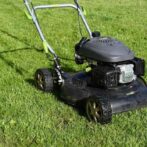Snapshots of Dementia: The Longest Yard
Photo by Andres Siimon on Unsplash I’ve had it!” my friend said. “I’m so tired of doing everything around here! She used to care so much about having a nice home. Now all she does is sit in front of the TV.” His words about his wife, who is living with dementia, reminded me of a time in our lives in 2015—more than four years before Tom was diagnosed. He seemed more tired every night than he had in the past, and I wondered if he was aging prematurely or perhaps just differently than I. And I really wondered about his obsession with simple computer games. In the evenings or on weekends, he would sit in front of his laptop for hours, not watching TV or engaging with me, just playing the same game over and over. In the meantime, I was either doing housework or working on a freelance assignment or walking the dog or. . . you get the picture. But what I didn’t do was lawn care. Our house in Florida didn’t have much of a yard; a pool and lanai (screened porch) took up most of the backyard. Mowing the grass didn’t take much time, but throughout our marriage, Tom had never wanted me to take on that chore anyway. And since I’m allergic to almost every kind of grass, I never minded. Over the past year or so, he had done less and less with our yard. But suddenly, he wasn’t taking care of the lawn at all. We had no children left at home, so we couldn’t assign this chore to one of them. The grass that had almost taken over some of the beds around the lanai was growing again, and I just couldn’t take on this job too. So—long before I took charge of our finances and every other aspect of our lives—I contacted a friend who has a lawn business. He and his team quickly got our yard back into shape, all while Tom and I were out of town, then continued servicing the lawn every week. What should have seemed strange was that Tom never objected to nor seemed grateful for this plan. In the past, paying someone for something he could do would not have been his idea of a wise expenditure. But he never said a word. In fact, only a few months after I hired the lawn service, Tom sold our lawnmower for a ridiculously low price to a neighbor who needed one. I was amazed. Was he planning never to mow the lawn again? Now that I know that he was at least on his way toward LWD, I know he didn’t have a plan...
Read More








